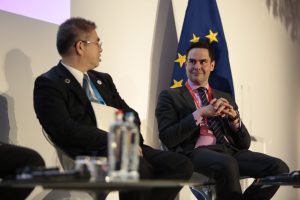I was super conscious of the driverless metro as I made my way to Copenhagen airport. I was enroute to an event about the responsible use of AI (artificial intelligence), the very technology that was powering my ride. AI is widely present in our lives with many positive impacts. But there are warning signs about the dangers of this new reality. Like the woman killed last year by a self-driving Uber on an Arizona street. The pros and cons pose an urgent question – can humans and AI safely coexist? This is what I hoped to find out as moderator of debates at the unveiling of ethical AI guidelines in Brussels. I am an experienced CNN anchor but this new tech frontier was stretching my mind!

Making AI Ethical
Artificial intelligence is already transforming our lives taking over mundane tasks, providing better medical care, defending against cyber threats and even helping to tackle climate change. But alongside the benefits come dangers like privacy invasion, discrimination and potential loss of human control. Brussels hopes to address these risks with AI standards based on EU values and principles.
The European Commission launched its Ethical AI initiative before ministers, entrepreneurs and experts attending Digital Day 2019 in April. The 7 ethical rules were drawn up by a high-level group of 52 experts from academia, industry and companies like IBM and Bosch. Among the key requirements – AI must not invade privacy, discriminate against people or harm the environment. Guideline authors also insist when things go wrong, humans should be held accountable. Aimee Van Wynsberghe, Assistant Professor of Ethics and Robots at UT Delft, Netherlands, says AI decisions are only as good as the data provided by people,
“ We are not creating agents that could be responsible for the consequences of their actions…So the first step… is to make sure that humans are really accountable for the decisions that (the agents) are making.”
Though voluntary, the principles could help shape future EU legislation. Mariya Gabriel, Commissioner for Digital Economy and Society urged companies to join the piloting phase by trying out the guidelines in their operations.
“We will now put these requirements into practice and at the same time foster an international discussion on human-centric AI.”
Gabriel says business feedback will be used to update the Ethical AI guidelines after the end of the piloting phase in early 2020.

Business Getting Involved
Companies like IBM and Bosch which are part of the high-level expert group are already making plans for the testing phase which begins in June. Francesca Rossi with IBM Research AI says her company will test the principles internally but also encourage its diverse client base to follow suit. They want to see how the rules perform in different industries.
“In some sectors maybe explainability will be the most important factor, in others where there are very high stake decisions accountability and redress will be required, in other areas that are more data intensive, the data issues will be more important.”
Christoph Peylo, Global Head of Bosch Centre for Artificial Intelligence, says data security is a top priority during the piloting phase.
“There is a danger of data set poisoning, so if the data is tampered with, this will affect the overall system.”

Brussels is exploring quantum technology as a tool against data tampering. Roberto Viola, Director General of DG Connect (the European Commission’s Directorate for Communication Networks, Content and Technology) launched a technical partnership with the European Space Agency to strengthen communications data security against hacking attacks.
For Denmark, getting consumers to buy into ethical AI will be top priority during the testing phase, says Torsten Andersen, Deputy Director General, Danish Business Authority. He says they are developing an ethical seal for consumers and a disclosure mechanism for companies to create a market demand for responsible AI products.
“We are working on a seal so the consumer can spot the ethical product and we are also working on disclosure of the major large corporate accounts.”

Competitive edge with AI ethics
Brussels hopes its ethics first approach will give it a competitive edge in global markets, making up for lagging investment behind China and the U.S. Andrus Ansip, EU vice-president of the Digital Single Market says people need trustworthy technologies to buy into their benefits. That is why he argues the ethical approach to AI is “not a luxury feature” but a must-have for everyone.
“Ethical AI is a win-win proposition that can become a competitive advantage for Europe: being a leader of human-centric AI that people can trust.”
Europe’s guidelines are already gaining interest in Canada, Singapore, and Japan.
“Fortunately the EU and Japan are sharing approximately the same viewpoints. And some of our friends like Canada are also sharing our values. And some of the international organizations like the G7 and also OECD and UNESCO.” says Famikazu Sato, Deputy Director General at Cabinet Office, Japan. Sato points out shared values will help Tokyo and Brussels to build a global consensus around Ethical AI, They can foster dialogue at international forums like the June G20 summit in Japan.
So, can humans and AI safely coexist? Here’s my takeaway as a lay person. It is up to us. It depends on the data we feed AI systems, how we use technology and maintain control over it. But we lack a playbook of rules to ensure consumers are protected, no one is discriminated or unfairly surveilled. If we get the standards right, then humans and artificial intelligence can become good friends.
Want to know more?
Sustainia is a global sustainability advisory firm that specialises in impact technology and artificial intelligence. Based in Copenhagen, Denmark, and Guangzhou, China we research and develop new insights and market opportunities. Sustainia is a co-founder of the Global Opportunity Explorer, the world’s largest platform for vetted and verified sustainable solutions, and serves as a matchmaker between business solutions and global challenges.
For more information, contact CEO Rasmus Schjødt Pedersen at rsp@sustainia.me.
Cover photo by Christopher Robin Ebbinghaus